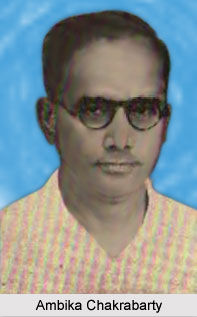 Ambika Chakrabarty was one of the Indian freedom fighter and a Bengali revolutionary who is renowned for his significant contributions in the Indian freedom struggle against the rule of British Empire of India. Ambika Chakrabarty was born in the year 1892, to father Nanda Kumar Chakarabarty. He was a member of the armed resistance movement, which was led by Masterda Surya Sen. Ganesh Ghosh was amongst the major members of the Indian Republican Army, which was a revolutionary group in Chittagong. It included a number of revolutionaries and Indian freedom fighters who conducted and participated in the famous Chittagong Armoury Raid Case in the year 1930. Later, he became the leader of the Communist Party of India as well as a member of the West Bengal Legislative Assembly.
Ambika Chakrabarty was one of the Indian freedom fighter and a Bengali revolutionary who is renowned for his significant contributions in the Indian freedom struggle against the rule of British Empire of India. Ambika Chakrabarty was born in the year 1892, to father Nanda Kumar Chakarabarty. He was a member of the armed resistance movement, which was led by Masterda Surya Sen. Ganesh Ghosh was amongst the major members of the Indian Republican Army, which was a revolutionary group in Chittagong. It included a number of revolutionaries and Indian freedom fighters who conducted and participated in the famous Chittagong Armoury Raid Case in the year 1930. Later, he became the leader of the Communist Party of India as well as a member of the West Bengal Legislative Assembly.
Revolutionary Activities of Ambika Chakrabarty
Ambika Chakrabarty became a member of the Indian Republican Army during the early 1930s. The Indian Republican Army was a revolutionary group of Chittagong that was led by Surya Sen. He, along with the revolutionary group, conducted the Chittagong Armoury Raid in the year 1930. The armoury raid in Chittagong was perhaps the most valiant and astounding revolutionary endeavours in the history of the Indian freedom struggle that was devised by the youths of the region. The attack was conducted on 18th April 1930 to raid the armoury of police and auxiliary forces from the Chittagong in Bengal province during the rule of the British Empire in India. The Indian Republican Army was led by Masterda Surya Sen and other prominent members included Anand Gupta, Ardhendu Dastidar, Sasanka Datta, Kalpana Dutta, Pritilata Waddedar, Naresh Roy, Nirmal Sen, Jiban Ghoshal, Ananta Singh, Tarakeswar Dastidar, Ambika Chakrobarty, Subodh Roy, Harigopal Bal (Tegra), Lokenath Bal and Ganesh Ghosh. He later became a member of the Chittagong Jugantar party.
On 18th April 1930, Chakrabarty led a group of independence activists, who damaged the whole communication system in the region of Chittagong. He became severely injured in a gunfight against the British Indian army in Jalalabad on 22 April 1930; but he managed to escape. Few months later Ambika Chakrabarty was detained by the British police from his hiding place and was sentenced to death after the trial. Later the death sentence was altered to transportation for life to the Cellular Jail in Port Blair.
Later Life of Ambika Chakrabarty
After he was released from the Cellular Jail in the year 1946, Ambika Chakrabarty joined the Communist Party of India and was elected to the Bengal Provincial Legislative Assembly. In the year 1952, he was elected to the West Bengal Legislative Assembly from Tollygunge (South) constituency as a Communist Party of India candidate. Ambika Chakrabarty died in 1962 in a street accident in Calcutta (now Kolkata)



















